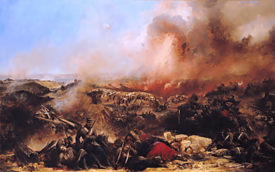Henry Mitchell Jones facts for kids
Quick facts for kids
Henry Mitchell Jones
|
|
|---|---|

Depiction of the Siege of Sebastopol
|
|
| Born | 11 February 1831 Crumlin, Dublin, Ireland |
| Died | 18 December 1916 (aged 85) Eastbourne, Sussex, England |
| Buried |
Ocklynge Old Cemetery, Eastbourne
|
| Allegiance | |
| Service/ |
|
| Years of service | 1849 - 1857 |
| Rank | Captain |
| Unit | |
| Battles/wars | Crimean War |
| Awards |
|
| Other work | Consul General |
Henry Mitchell Jones (also known as Henry Michael Jones) was a very brave Irish soldier. He lived from 1831 to 1916. He received the Victoria Cross, which is the highest award for bravery. This special medal is given to soldiers in the British and Commonwealth forces. Later in his life, he became a British diplomat, working for his country in other parts of the world.
Contents
Henry Jones: Early Life and Military Service
Henry Jones was born in Dublin, Ireland. He joined the army in 1849 as a young officer called an ensign. In 1854, he moved to the 7th Regiment of Foot, which was later known as the Royal Fusiliers. This happened during the Crimean War.
Bravery at the Battle of Alma
During the Battle of the Alma on September 20, 1854, Henry Jones was a lieutenant. He was carrying the Queen's Colour, which is a special flag for the regiment. During the battle, he was badly wounded by a gunshot. The bullet went through his lower jaw.
Amazingly, he carried the bullet in his jaw for 30 years! He didn't know it was there until he had a toothache. A doctor removed the bullet, which had been stuck in his jawbone all that time.
Heroism at Sevastopol
In 1855, Henry Jones was promoted to captain. He earned the Victoria Cross for his incredible bravery during the Siege of Sebastopol. This happened on June 7, 1855.
He was part of a group that attacked and captured an enemy position called the Quarries. Captain Jones bravely led his men again and again. They had to fight off many attacks from the enemy throughout the night. Even though he was wounded early in the evening, he stayed at his post without moving. He remained there until the next morning. His award was officially announced in September 1857.
Life as a Diplomat
Just three months before his Victoria Cross was announced, Henry Jones left the army. He decided to join the Diplomatic Service. This meant he would work for the British government in other countries.
He became a Consul in the Fiji and Tonga Islands in 1863. A Consul is like a representative who helps citizens and promotes trade. Later, he became a Consul-General in different cities around the world. These included Tabreez (1868), Christiania (1875), and Philippopolis (now Plovdiv) in 1880.
In 1889, he was appointed as a Minister Resident in Bangkok, Thailand. A Minister Resident is a diplomat who represents their country. In 1895, he moved to Lima, Peru, and Quito, Ecuador, as a Minister Resident and Consul-General.
He retired from his diplomatic work in 1898. Henry Mitchell Jones passed away in Eastbourne, England, on December 18, 1916.
The Victoria Cross Medal
Henry Jones's Victoria Cross medal is a very important historical item. It is currently on display at the Victoria Barracks in Sydney, New South Wales, Australia.
 | Selma Burke |
 | Pauline Powell Burns |
 | Frederick J. Brown |
 | Robert Blackburn |

